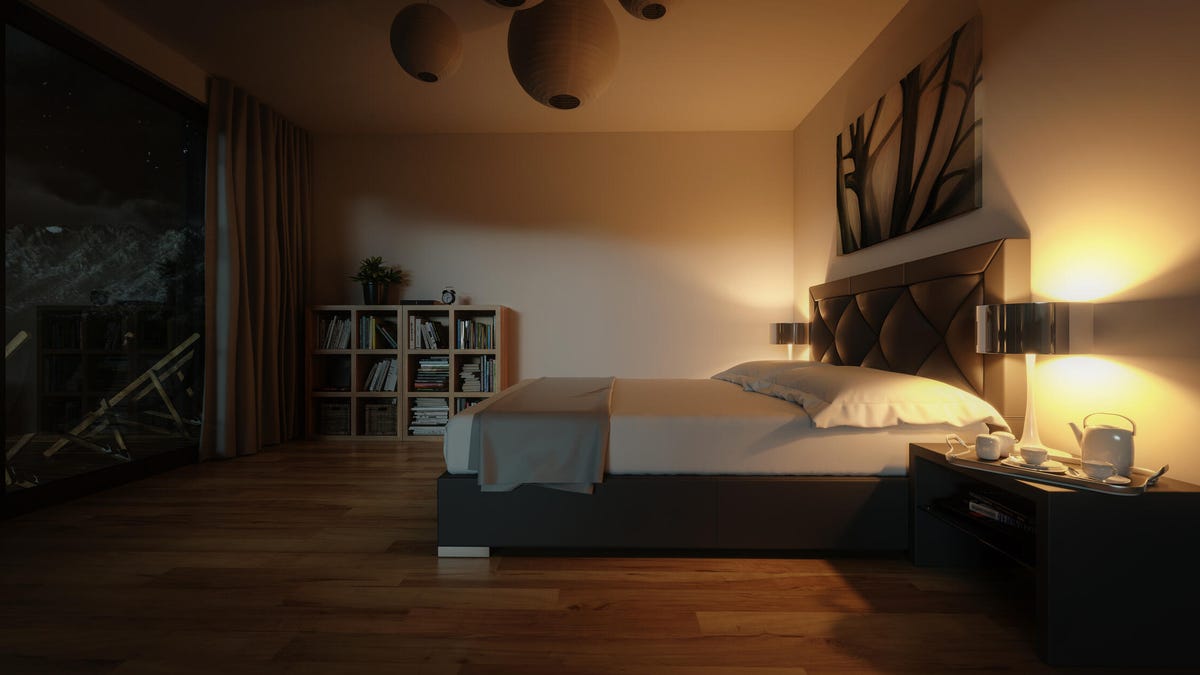 Why You Can Trust CNET
Why You Can Trust CNET Create the Ideal Environment for the Best Sleep Ever
Your environment can deeply impact the quality of your sleep. Follow these tips to create a sleep-inducing bedroom.

Your sleep environment can make the difference between getting a good night's sleep and staying awake all night. Studies show that the setting you sleep in can greatly influence your sleep quality. Temperature, noise, smell and light levels are factors that can come together to build the perfect sleep environment -- so you can fall asleep and stay asleep.
Create the best ambiance to catch those ZZZs with these easy tips.
Read more: Best Mattress
How to create an ideal sleep environment
Ideally, you want to create an environment that promotes relaxation. Think of the elements in your room that stimulate your senses and mind. If you reduce them as much as possible, this will help you establish a setting that eases you into sleep. Below, you'll find the most common things that influence your sleep and how to make them work for you.
Read more: This 5-Minute Trick Can Help You Fall Asleep at Night
1. Set your room at the right temperature
A warm room temperature may cause discomfort and difficulty staying asleep, especially if you like to sleep with thick sheets. You want to aim for a cool, comfortable temperature for your body heat. According to the Sleep Foundation, the ideal room temperature for better sleep is around 65 degrees Fahrenheit. This may vary from one person to another, depending on whether you are a hot sleeper and the type of bedding you use.
Read more: Best Cooling Mattress for Hot Sleepers
2. Reduce noise
This one is no surprise; it's hard to stay asleep when there's too much noise. Research shows that persistent nocturnal noises not only affect the quality of sleep but may also have long-term effects on your overall health. If noise levels are out of your control, you can try a white noise machine or play soft music.
3. Make it as dark as possible
It's best to keep light levels as low as possible while you sleep. Your body's circadian rhythm responds to light and may cause your brain to think it's daytime. It's best to keep your room light-free. This could mean reducing the use of electronic devices in your room like computers, TVs and cell phones. If too much light comes through your windows or curtains, you can try investing in blackout curtains to minimize light exposure.
Blackout curtains can help keep your room dark for better sleep.
4. Use soothing aromas
Unless it's the smell of fresh coffee in the morning, it's highly unlikely that odors will wake you up while you sleep. Some scents can help you relax. Aromas like lavender have been proven to promote a sense of relaxation and help you sleep.
Lately, I've been loving the Perfect Night's Sleep essential oil blend by Neom to create a relaxing environment before bed.
5. Keep your room organized and clean
An unorganized or cluttered room may cause you to feel stressed. This does not mean that your room needs to be in tip-top shape all the time, but if left unorganized for too long, the stress can affect your sleep. Keeping your room nice and tidy will make it visually relaxing.
Keeping your room clean extends beyond keeping surfaces and the space clean. It means washing your sheets and pillowcases frequently too. You should aim to wash your sheets at least every two weeks and your pillowcases weekly.
6. Limit the use of electronics before bedtime
I know, I know -- you've heard this one before. But I cannot stress enough how much the use of electronics can negatively impact your sleep quality when used too close to bedtime. Let's talk about the science behind it.
Your body works on a 24-hour cycle, also known as circadian rhythm. This lets your brain know when it's daytime and time to sleep. The light on your devices can signal to your brain that it's still daytime and cause you to have a restless night. If it's absolutely necessary for you to use electronics before bed, set your phone's screen to night mode in your settings, which reduces blue light exposure. Alternatively, you can try using blue-light-blocking glasses.
Read more: Best Blue Light Blocking Glasses
7. Use soft sheets to make your bed comfy
Is there any better feeling than to crawl into a cool, soft bed after a long day? There are quality bed sheets for all budgets. If you are a hot sleeper, you'll want to opt for light and breathable sheets. If you live in a cold place or it's winter, flannel sheets will probably be your best option.
If you want your bed to feel like a nice hug, you can check out weighted blankets for an extra level of comfort.

